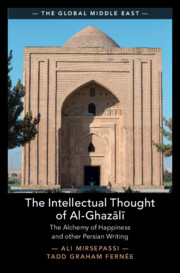Book contents
- The Intellectual Thought of Al-Ghazālī
- Reviews
- The Global Middle East
- The Intellectual Thought of Al-Ghazālī
- Copyright page
- Contents
- Acknowledgments
- Note on Transliteration
- Introduction
- 1 The Time and Life of Ghazālī
- 2 Reading Ghazālī in the West
- 3 The Poetic Imagination and the Politics of Ambiguity
- 4 The Troubled Orthodoxy in the Academic Study of Islam
- 5 A Path to Reform
- 6 A Cosmopolitan Reading of Ghazālī
- 7 Ghazālī’s Practical Ethics
- Bibliography
- Index
6 - A Cosmopolitan Reading of Ghazālī
Published online by Cambridge University Press: 16 January 2025
- The Intellectual Thought of Al-Ghazālī
- Reviews
- The Global Middle East
- The Intellectual Thought of Al-Ghazālī
- Copyright page
- Contents
- Acknowledgments
- Note on Transliteration
- Introduction
- 1 The Time and Life of Ghazālī
- 2 Reading Ghazālī in the West
- 3 The Poetic Imagination and the Politics of Ambiguity
- 4 The Troubled Orthodoxy in the Academic Study of Islam
- 5 A Path to Reform
- 6 A Cosmopolitan Reading of Ghazālī
- 7 Ghazālī’s Practical Ethics
- Bibliography
- Index
Summary
The chapter examines the methodological conundrums of producing knowledge about past traditions through present-day realities, a dilemma we navigate using the “progressive-regressive” method, a term first articulated by Marc Bloch. But beyond the study of the past, the study of the non-Western world poses particular challenges, which we explicate using Joan Cocks’ concept of neo-cosmopolitanism. The Islamic world, while culturally and historically distinct, has always operated within global circuits of economic and political exchange and has shared social imaginaries with the universal civilization of a given time. Where necessary we transcend the limits of three epistemic postures: Enlightenment liberalism, Orientalism, and postmodernism. We examine the status of “science” in the Abbasid world in relation to Ghazālī’s distinction between profane natural knowledge and sacred signs (āyat). Political fragmentation and economic change overlapped with Islam’s encounter with foreign scientific traditions. Ghazālī intervened to differentiate ẓāhir (the apparent) and baṭin (the hidden) as reconcilable components of knowledge, rendering these encounters theoretically coherent.
Information
- Type
- Chapter
- Information
- The Intellectual Thought of Al-Ghazālī , pp. 180 - 207Publisher: Cambridge University PressPrint publication year: 2024
